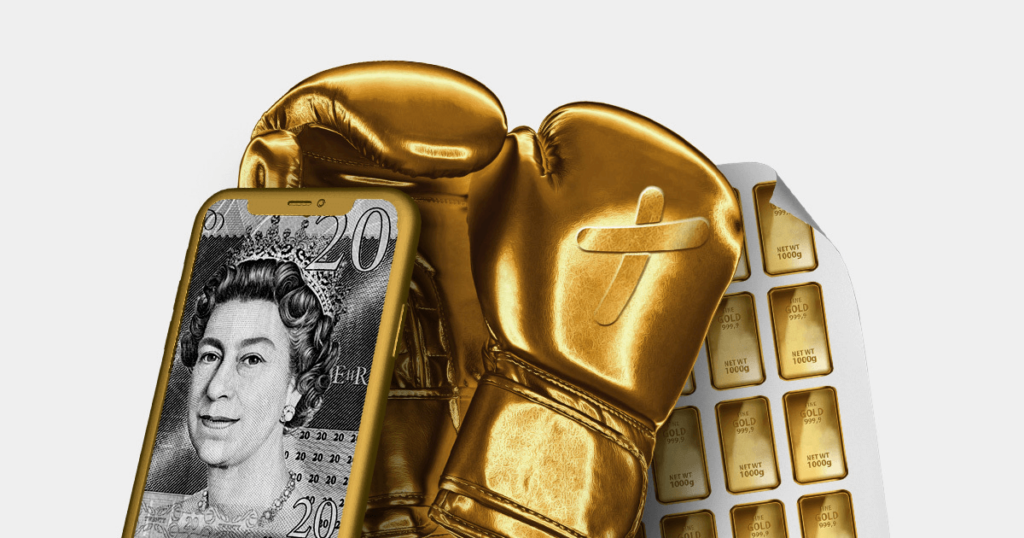Banking Wobbles, and Recession Fears, Fuel a Flight to Safety
Gold has made headlines again — and for good reason.
In April 2025, spot gold surged to a record-breaking £80.14 per gram — its highest level ever. That’s not just a headline figure — it represents more than a 10% rise over the last three months, driven by renewed anxiety in the banking system and growing recession fears.
The backdrop? Volatile stock markets, looming trade wars, and warnings from financial institutions about tightening credit conditions. But more immediately, a series of shocks in the global banking sector have rekindled memories of 2008 — and British savers are watching closely.
Recent data from the Financial Times shows UK-listed banks have taken a hit, with share prices sliding and market confidence dipping as global events cast long shadows. Concerns over loan book quality, especially in commercial real estate, are now playing out across Europe too, with credit tightening and risk appetite thinning.
When recession fears meet banking instability, investors look for safety. And gold tends to be the first port of call.
What’s Actually Going On with the Banks?
While the UK’s big high street banks haven’t made collapse headlines (yet), there’s been a noticeable shift in tone from regulators and analysts. Several mid-sized American banks recently announced lower-than-expected profits due to weakening credit portfolios, and that turbulence has crossed the Atlantic via global markets.
Even more worrying is that the reaction isn’t just coming from investors — it’s from within the banking system itself. The Bank of England has issued a fresh round of “stress testing” guidelines, and mortgage approvals in the UK have dropped sharply month-on-month.
Savers and investors alike are beginning to ask uncomfortable questions:
– How safe are my deposits?
– What happens if the market turns further?
– Where can I store value if the banks falter and a recession deepens?
This growing discomfort — and the rising risk of a UK recession — has pushed up demand for safe-haven assets. And gold, with its long history of wealth preservation, fits the bill.
Gold’s Safe-Haven Status Proven (Again) During Economic Downturns
This isn’t the first time gold has rallied in response to recessionary fears — and it likely won’t be the last.
Historically, gold tends to shine brightest when confidence in traditional institutions dims. During the 2008 financial crisis and the Great Recession, UK investors saw gold rise more than 30% in a year. After the Brexit vote in 2016, gold prices jumped again. In 2020, amid the COVID-19 recession, gold reached record levels.
Now in 2025, we’re seeing another surge — driven by macro fears and a very practical problem: people don’t want to leave their money in uncertain places.
According to The Guardian, the current rally is being fed not just by global instability, but by a clear change in consumer behaviour. UK households are reportedly checking gold holdings, re-evaluating their savings strategies, and increasing exposure to precious metals to hedge against recession and inflation risks.
And it’s not just the wealthy. Everyday savers are getting gold-curious. Unlike past decades, buying gold no longer requires navigating the complexities of coins or vaults — modern platforms have made access simpler, and the appeal broader.
What Market Volatility and Recession Signals Mean for UK Savers
If there’s one lesson from the past few years, it’s that financial stability can’t be taken for granted — even here in the UK.
With inflation still above the Bank of England’s 2% target and savings rates lagging, keeping cash in a bank account often means losing purchasing power. Add the highest cost-of-living squeeze in decades and rising unemployment fears — and it’s clear that relying solely on cash savings or stocks isn’t enough.
Cash in the Bank? Safer, But Losing Value
UK savings accounts — including ISAs — offer 3.5% to 4.2% interest, depending on term length. But with inflation still hovering around 5%, real returns remain negative. That means £10,000 in the bank today could be worth £9,500 or less next year in real terms. If confidence in the banking system slips further — or if a technical recession hits — savers could be more exposed than they realise. But that loss of returns doesn’t even take into account the ongoing devaluation of the pound.
The Money Supply Effect: How Central Bank Actions Impact Your Savings
When central banks expanded the money supply (commonly called M2) dramatically in recent years, they created a hidden tax on savings. During the pandemic alone, the UK’s money supply increased to over £3 trillion, and for every pound that’s printed the value of your money goes down.
Think of it this way: if there were 100 pounds in the economy yesterday, and today there are 115, each pound now represents a smaller slice of the economic pie. Your savings retain the same numerical value, but their purchasing power decreases.
In addition M2 is a very real contributor to Consumer Price Index (the cost of goods for the consumer) escalation. Since 2000 the cost of goods for UK consumers has increased a whopping 87%! In other words, what cost £100 in 2000 would cost about £187 in February 2025.
This devaluation of the pound creates a paradox for savers. While seeking safety in cash seems prudent during uncertain times, it’s precisely this safety-seeking behaviour that leaves your wealth vulnerable to a powerful and invisible form of erosion.
Stocks Still Sluggish — and Sensitive to Bad News
UK equities haven’t had a strong start to 2025. While the FTSE 100 is holding, investors have grown increasingly defensive, shifting into utilities and gold-related assets.
But stocks remain sensitive to recession talk. A trade spat, a weak earnings report, or a policy signal from the Bank of England can swing portfolios in hours. That’s stressful for savers looking for calm, not chaos.
That’s where gold steps in — not as a replacement, but as a stabiliser.
Physical Gold, Digital Gold, or ETFs? What to Know
If you’re thinking about gold as part of your savings or investment strategy, you’re not alone. But the way you access gold matters — each option comes with different risks, tax implications, and practicalities.
Here’s a clear breakdown of the three main routes available to UK savers.
Gold ETFs and Other Financial Products
Gold exchange-traded funds (ETFs) are a common choice for investors looking to track the price of gold without handling it directly. These funds are traded on stock markets and are easy to buy through brokerage platforms.
What to keep in mind:
- You’re not buying actual gold. Instead, you hold a share in a fund that may or may not be backed by physical gold.
- ETFs are relatively liquid and suit short- to medium-term exposure.
- UK investors are liable for Capital Gains Tax (CGT) on profits from ETFs, unless they’re held within a tax-efficient wrapper like a stocks & shares ISA.
- You have no redemption rights for the underlying gold, meaning if markets are disrupted, your access is still tied to the system you’re trying to hedge against.
Best suited for: investors looking for short-term exposure and easy portfolio diversification, who are comfortable with financial instruments.
Physical Bullion – Coins and Bars
Gold coins and bars offer direct ownership and are a popular store of value, particularly in uncertain times.
Benefits:
- You own tangible gold with no counterparty risk.
- UK legal tender coins (like Sovereigns and Britannias) are exempt from CGT for UK residents, which can make them a tax-efficient option.
- Investment-grade gold is exempt from VAT in the UK, provided it meets certain purity standards (typically 99.5% for bars, 91.6% for coins) .
Considerations:
- You’ll need secure storage, which could involve home safes or specialist vaulting services — both of which add cost.
- Selling physical gold may take time, and pricing can vary depending on the buyer and premiums applied.
- If you’re holding gold to access in an emergency, having it locked in a safe may not offer the flexibility you need.
Best suited for: those focused on long-term wealth preservation and willing to manage the logistics of storage and resale.
Digital Gold Ownership with Direct Control
Digital platforms are modernising the way people own gold. Some services, like TallyMoney, let users hold actual physical gold — not just a derivative — with instant access and usability.
How it works:
- You hold physical gold (1 tally = 1 milligram), stored securely outside the traditional banking system.
- Your gold is accessible via a debit Mastercard, allowing you to spend or move funds as needed.
- Unlike financial instruments, you’re not exposed to ETF fund risk or reliant on broker access.
- CGT rules apply as you’re holding a real asset, but the ease of access and no lock-in period offer flexibility that suits everyday financial planning.
Best suited for: those who want real gold ownership combined with digital ease — without the paperwork, vaulting decisions, or market middlemen.
Which Gold Format Works Best for You?
There’s no one-size-fits-all answer — your choice depends on what you value most:
- Looking to track the price of gold and trade often? An ETF may fit, but check the tax implications.
- Want tax efficiency and are prepared for storage admin? UK legal tender coins could offer long-term value.
- Prefer easy access to your gold while keeping it outside the traditional financial system? Digital platforms offering real physical gold with spendable convenience could be the practical middle ground.
Each option plays a role. The key is knowing what you’re actually getting — and what you’re giving up.
Final Thoughts: Stability Still Matters
From inflation pressure to economic shocks, gold continues to prove itself as a financial safety net — but how you own it makes all the difference.
More UK savers are seeking out options that feel less like speculation and more like sensible preparation. If you’re looking to keep your savings intact without locking them away or navigating confusing financial products, consider how gold — in the right format — could strengthen your approach.
Save wisely. Stay prepared. Own something real.
If you’re ready to hold value outside the noise of the system, gold makes sense — and now it’s easier than ever to access.








